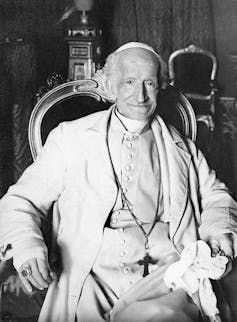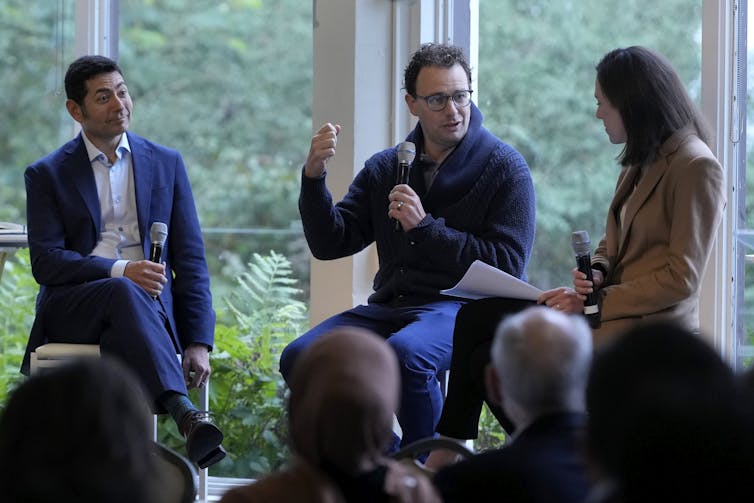(The Conversation) — When Robert Francis Prevost chose the papal name Leo XIV, it could have meant many things. There were 13 Leos before him: The first, Leo the Great, was a fifth-century theologian who helped heal the doctrinal divisions among early Christians; Leo X, a member of the powerful Medici family, helped provoke the Protestant Reformation with his lavish lifestyle and sale of indulgences.
Two days after his election, the new pope affirmed the most likely inference: that his name was a tribute to the most recent Leo, Pope Leo XIII, who died in 1903. Less obvious, however, was what inspired his choice: the rise of artificial intelligence.
As the new pope told the College of Cardinals on May 10, 2025, he was inspired by his namesake’s teachings about economic justice during another time of radical technological change. Leo XIII applied Catholic tradition to the Industrial Revolution in a historic encyclical called Rerum Novarum, which became the founding document of modern Catholic economics.
“In our own day,” Leo XIV said, “the Church offers to everyone the treasury of her social teaching in response to another industrial revolution and to developments in the field of artificial intelligence that pose new challenges for the defense of human dignity, justice and labor.”
I am a scholar of economic thought around technology and religion, and so the invocation of the previous Leo had immediate resonance for me. What lessons is the current pope drawing from his predecessor? What would Leo XIII say about AI?
19th-century teachings
Some might imagine that the answer is some kind of outright rejection. The Catholic Church has a sometimes earned reputation for denouncing the modern world in favor of its centuries-old traditions.
One aspect of the reign of Leo XIII, who became pope in 1878, was an attack on modern individualism, which he denounced as “Americanism.” But his relationship with modernity was far from simply rejecting it. Leo XIII was the first pope captured on film, for instance, and he blessed the camera that recorded him.
Leo XIII was the first pope to appear on film.
In Rerum Novarum, which appeared in 1891, Leo responded to the roiling struggles between Gilded Age capitalists and the industrial workers they systematically exploited. The “teeming masses of the laboring poor” received “a yoke little better than that of slavery itself,” he wrote.
The 19th-century pope refused to endorse either the capitalists’ wait-and-see promise of progress or the communists’ longing for a dictatorship of the proletariat. Instead, he offered a vision that became the cornerstone of modern Catholic social teaching.
Leo XIII’s prescription for the Industrial Revolution of his time was to embrace private property, like the capitalists, but to spread it out far more widely among workers. Rerum Novarum contends it is “just and right that the results of labor should belong to those who have bestowed their labor.” If workers become owners, he explained, they can have a part in stewarding the gifts of God.

Leo XIII’s writings have formed the foundation of modern Catholic social thought.
L’Illustrazione Italiana via Wikimedia Commons
The pope further called for public policy that would spread wealth and power in the industrial economy through widespread ownership: “The law, therefore, should favor ownership, and its policy should be to induce as many as possible of the people to become owners.”
This was a radical position then, as it is now. Following Leo XIII’s call, many Catholics searched for ways to share ownership of industry more widely. This movement gave birth to cooperative businesses around the world, from the North American credit union system to the Mondragon Corporation in the Basque region of Spain, an industrial behemoth owned and governed by its workers.
But for most of the world, Leo’s plea was forgotten in the capitalist-versus-communist Cold War.
21st-century tech
Today, we inhabit yet another Gilded Age. Wealth inequality in the United States has reached similar levels as in Leo XIII’s time, once again thanks to technological disruptions that funnel the benefits to a small elite. AI threatens to put the platform economy on steroids, upending work with the bots that only a few companies can afford to build.
Policy debates about AI tend to be limited to what the big tech CEOs should or shouldn’t do. The Biden administration was poised to enshrine a few powerful companies as the arbiters of AI, handing them and the government power to determine what is and isn’t ethical. Now, the Trump administration is pulling out all the stops to compete with China. “The AI future is not going to be won by hand-wringing about safety,” Vice President JD Vance, who is Catholic, told a major AI summit soon after taking office. “It will be won by building.”
Channeling Leo XIII to confront the AI revolution, however, means looking past prevailing ideas, as he did in his time. His teachings suggest that the people who create and use AI should be the ones who actively own and govern it.
This could take many forms. For instance, already there are workers organizing to shape how AI is deployed in their workplaces. In other contexts, cooperative businesses such as Land O’Lakes have worked with farmer-owners to use the data that farm machines produce to improve their practices. People do not have to be merely passive users of AI tools; when they have well-organized democratic power through unions and co-ops, they can make the technology more accountable to them.
AI companies themselves can spread ownership and governance more widely. Fears about the dangers that powerful AI could pose if it gets out of hand have already prompted some founders to adopt unusual corporate structures. Anthropic, the company behind the AI assistant Claude, is a public-benefit corporation, which means that it can prioritize long-term social benefit above shareholder profits. OpenAI, the maker of ChatGPT, is owned by a nonprofit – an arrangement that has resisted efforts to turn it into a more conventional kind of company.

Dario Amodei, CEO and co-founder of Anthropic, middle, speaks on a panel at an event about AI safety in 2024.
AP Photo/Jeff Chiu
But these structures still assume that AI’s future should be in the hands of an aristocracy of business and technical elites. Leo XIII, on the other hand, argued that everyone who participates in an enterprise should have a stake in it.
For AI, that could include not only company employees but also the users who train the models, the communities that share their water and power with data centers, the workers who mine the raw materials for high-performance chips, and the creators who contribute to the systems’ knowledge.
Early research has suggested that ordinary people are very concerned about turning power over to machines that they do not yet understand. They see consequences of AI in their lives that engineers in Silicon Valley are less likely to consider, from racial discrimination to workplace surveillance. Also, as a wonderful story by the science fiction writer Cadwell Turnbull suggests, people will likely use and trust AI more if they know it is truly accountable to them.
In January 2025, the Vatican released a document calling for a “renewed appreciation of all that is human” in the age of AI. It warned against what Pope Francis called the “technocratic paradigm”: the mindset that gives up humans’ role as stewards of God’s creation and hands power over to systems, whether they are stock markets or computer programs.
By taking the name Leo, I believe the new pope is suggesting something similar. The important question is not whether new technologies are good or bad. What matters far more is whether we can learn to share the responsibility of stewardship – whether we can all be partners in what this new industrial revolution is making possible.
(Nathan Schneider, Assistant Professor of Media Studies, University of Colorado Boulder. The views expressed in this commentary do not necessarily reflect those of Religion News Service.)







